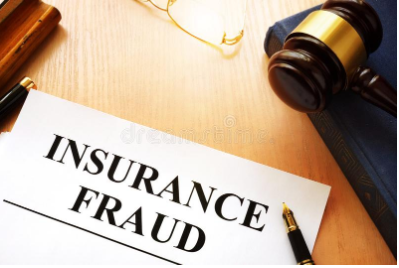
Insurance Fraud In Florida: What You Need To Know
Florida is famous for many things. It’s sandy beaches, diverse culture, and, unfortunately, insurance fraud. Although it has declined a bit since its peak in 2011-2014, Florida is one of the top states in the country for insurance fraud year after year and it’s not something to be proud of. According to the Division of Insurance Fraud’s annual report, there was a total of 17,392 suspected fraud referrals and the court ordered a total of $51,203,744.42 in restitution in the 2014-2015 fiscal year.
It’s important to know what happens and what consequences one may face when being accused of insurance fraud in Florida. Here is a brief summary of insurance fraud laws in Florida and what you need to know if you find yourself charged with insurance fraud.
Basics
Insurance fraud is the act of submitting an insurance claim that is false, exaggerated, or based on a deliberate injury or loss. Doing this can be grounds for a charge of insurance fraud. Florida is one of the states with the highest rate in Personal Injury Protection (PIP) fraud. According to the National Insurance Crime Bureau, Miami is in third place after New York and Tampa. This car insurance fraud occurs when someone lies about an event to receive an insurance payout (or an increased payout) or a better rate. Insurance fraud can lead to severe penalties and even land the offender in jail. Car insurance fraud can be as simple as lying about your address or as serious as faking an accident.
What are the different types of car insurance fraud?
Car insurance fraud can take the form of false claims, lies by omission on applications, and more. It doesn’t always look like an obvious crime; even leaving out details to reduce your premium is considered fraud. Auto insurance fraud can be divided into two main types: soft fraud and hard fraud.
- Soft car insurance fraud typically refers to exaggerating a claim or an event. Suppose you claim that the dent in your bumper from backing into your mailbox was from a recent hit and run. That may seem minor, but it’s actually considered a car repair insurance scam. Soft fraud can also refer to leaving out critical details on your auto insurance application.
- Hard car insurance fraud is typically a more serious offense involving larger payout amounts, such as faking an accident or abandoning a vehicle and claiming it was stolen. While both types of fraud can result in jail time, penalties for hard fraud tend to be more severe.
Examples of car insurance fraud include:
- Providing a false address: Your auto insurance rate is partially based on where your car is usually parked overnight. If you live somewhere with a high rate of auto theft, your premium may be higher. Lying about the address your vehicle gets parked at is illegal, even if you’re related to or know the people who live at the false address you list.
- Abandoning or destroying a car and reporting it as stolen: When a vehicle gets stolen and is not recovered, the insurance company considers the car a total loss and pays out the vehicle’s actual cash value. It’s a serious crime to report a car as stolen after you’ve somehow disposed of it, hidden it, or sold it.
- Filing multiple claims for one accident: If you’re involved in an accident, one claim should be sufficient for all medical expenses and vehicle repairs. It would be considered fraud to try to pass off multiple damage or injury claims as being caused by different car accidents if they actually occurred during one. Plus, because a claim may cause your premium to go up when your auto policy renews, multiple claims could increase your likelihood of a higher insurance price.
Professionals Committing Insurance Fraud
In Florida, individuals in certain professions have different requirements when submitting insurance claims. Professionals with different requirements include physicians, osteopathic physicians, chiropractic physicians, practitioners, and even hospitals and their administrators.
Such physicians are prohibited from intentionally conspiring with others to commit insurance fraud, benefit from insurance fraud, or urge another who is covered by insurance to commit insurance fraud. This fraud can take many forms, such as solicitation, referrals, exaggerating injuries, etc.
These licensed professionals are also likely to face punishment from Florida’s Board of Medicine or whichever body has licensed them to practice in Florida.
Similarly, attorneys in Florida are forbidden from benefiting from insurance fraud, and they are also likely to face administrative proceedings by the Florida bar.
How is the investigation process conducted with insurance fraud?
Insurance companies are not dumb. They have been doing this for a long time and would not be in business if they paid every claim. They have entire departments or outside law firms dedicated solely to investigating claims. These investigators will monitor the claimant, look up previous accidents to see if the claimant reports an abnormal number of previous claims, interview witnesses of the accident, look through previous medical records, and analyze physician billing statements. Because of our technological advanced society today, claimants can make it easier for investigators to identify insurance fraud.
Penalties
The penalties for insurance fraud in Florida vary depending upon the amount of fraud involved, but in all cases a conviction for insurance fraud is a felony.
- If the fraud involved is less than $20,000, a conviction is a third-degree felony, punishable by up to five years in prison and a fine of up to $5,000.
- If the fraud involved is between $20,000 and $100,000, a conviction is a second-degree felony, punishable by up to ten years in prison and a fine of up to $10,000.
- If the fraud involved is over $100,000, the conviction is a first-degree felony, punishable by up to fifteen years in prison and a fine of up to $15,000.
Soliciting individuals involved in a motor accident offering to help them in taking legal action also falls under the insurance fraud statute, and a conviction is a second-degree felony. Solicitation is a serious issue in Florida. More information can be found in another Suarez & Montero blog.
The fact is the high levels of fraud begin committed in Florida affects us all. Due to the high number of fraudulent claims, payouts, and expensive litigation, the annual cost of an average Florida homeowner’s insurance policy will skyrocket to $4,231 in 2022, nearly three times the U.S. annual average of $1,544. Florida is already one of the most expensive states for auto insurance. According to The Zebra, a car-insurance comparison site, the average cost of car insurance in Miami for a person with an accident is more than $2,000, compared to the national average price, which is $800.
If you or a loved one is involved in an accident, call Jaime “Mr. 786Abogado” Suarez today!





